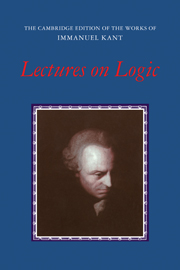Book contents
- Frontmatter
- Contents
- General editors' preface
- Acknowledgments
- Translator's introduction
- PART I The Blomberg logic
- Introduction to the doctrine of reason according to the thoughts of Professor Kant
- Introduction to the doctrine of reason according to the Author
- The doctrine of reason itself: The first principal part
- The doctrine of reason itself: The second principal part
- The doctrine of reason itself: The third principal part
- The doctrine of reason itself: The fourth principal part
- PART II
- PART III The Dohna-Wundlacken logic
- PART IV The Jäsche logic
- PART V Appendixes
- Explanatory notes
- Name index
- Subject index
The doctrine of reason itself: The third principal part
Published online by Cambridge University Press: 05 June 2012
- Frontmatter
- Contents
- General editors' preface
- Acknowledgments
- Translator's introduction
- PART I The Blomberg logic
- Introduction to the doctrine of reason according to the thoughts of Professor Kant
- Introduction to the doctrine of reason according to the Author
- The doctrine of reason itself: The first principal part
- The doctrine of reason itself: The second principal part
- The doctrine of reason itself: The third principal part
- The doctrine of reason itself: The fourth principal part
- PART II
- PART III The Dohna-Wundlacken logic
- PART IV The Jäsche logic
- PART V Appendixes
- Explanatory notes
- Name index
- Subject index
Summary
THE FIRST SECTION
Of the use of words
The character of words is an object worthy of the philosopher's consideration. Their right use is to signify a thought exactly.
A terminus inanis is one whose meaning we believe we understand but do not in fact understand. An expression is deceptive where we believe that something is possible and yet it is impossible.
A terminus familiaris is that expression whose sense has never been investigated because it has never been heeded. Every language has such terms. I say, e.g., addicted[.] On closer investigation such terms are often deceptive.
The phrase learned merchandising is a deceptive business, since one puts forth words as things[;] what is more common than this expression and deceit! An expression that can be understood is called understandable. Something can be understandable without being distinct. When 2 expressions have one meaning, or where their meanings are at least not very different, then they are called synonymous expressions. If an expression has more than one meaning then it is called terminus vagus ambiguus anceps.
THE SECOND SECTION
Of the learned style of writing
Style actually means a carver's tool. Here it means the character in which one expresses one's thoughts. Everyone has his own particular style, just as everyone writes his own particular hand. Style is to be considered (1.) insofar as it is adequate to its object. (2.) To the person (subject) and the person's social position.
- Type
- Chapter
- Information
- Lectures on Logic , pp. 239 - 243Publisher: Cambridge University PressPrint publication year: 1992



